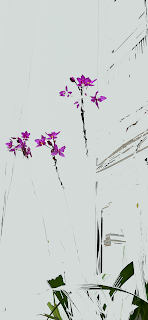It was such a lovely
Monsoon morn,
Fervently poised to pen
My long awaited poem
On love and its
delusion,
After such a long
hiatus
In a dew drenched
sojourn;
But intuition
intertwined
With a pair of eyes
Slashed through my
Like every other dawn:
All the withered words
In the clouded vision,
Left my empty
manuscript
Looking so helplessly
forlorn,
With all my self-drawn
delusion,
With the severed wings
Of all my flustering
imagination-
My zahir played a part
though,
Like in a desert,
With the mirage of an
ocean.
I
left my manuscript too,
Taking
resort to the prosaic wanderings along the chameleon clouds over the ridges of
a mountain, feeling the droplets of rains passing through my unwinged
imagination; but the shrouds never drizzled down. The dawns kept coming on and
on… And then I came across a night with a moon…
It was such a lovely
Blooming moon,
Weaving beauties
With the wild blue
petals
Along a lonely
Secluded lawn;
Echoing couplets
Of a melancholic epic
Floating around
In the ashen blue sky
Of my raining heart.
But, they were all
gone,
All on a sudden,
Like a spectrum
In a mid-summer
illusion:
Swept away
By a November wind
From the north end.
And
I knew it’s time to head for the North, for the nomadic way in search of my
zahir that I met once in a godforsaken island in one of my dreams; or may be in
a devil-may-care inter-section with a parallel dimension. And it’s where the
Meghbalika I chanced to have painted got stuck into my wayward imagination. A
pilgrimatic expedition is all I need to stop my soul erosion or to find myself
back again in the downtown, may be by saying aloud all my untold stories,
giving way to the new ones to be sewn. But, the zahir I lost my poem in is my
love with all its delusion:
Oh Sir, she smiled
sometimes
For whatsoever reason
To stir up the whole
Pacific Ocean;
Which had nothing to do
with me-
But my heart somehow
reached
At the centre of the
whirlpool
With the fins of my
befooling imagination.
Then there was the kind
of look:
Could have easily
pierced through
The heart of any
bohemian fellow
Like the arrows of
Apollo;
Which I thought to be
meant for mine-
Which I thought to be
from Cupid
With a suddenly discovered
passion.
And sometimes those
fireballs from the eyes:
I could easily
interpret them to be
The outburst of
emotion;
But, never could I
imagine
The feelings I dreamt
to be reciprocal
Were just the
reflection
Mirrored by my own
obsession.
But I can feel the rain
and feel her
Like the flow of a
monsoon;
I can keep walking in
the drizzling
With a cup of coffee
And some freshly woven
dreams,
And I feel her walking
by me
Like the flow of a flaming infatuation:
That’s how the zahir
and the Esther
Keep coming in
together;
And I know both the
delusion
And the zahir have to
disappear
For the love to paint
even deeper;
For an unfinished poem
to reach a harbour;
For all the blissful
pains to savour.
But the love with all its delusion
Just want to glide on
with the lotus-eaters;
With the zahir and its
obsession…
But, it’s time for the
nomadic way,
It’s time to rend, and
it’s time to sew:
Winters are long, and
Ithaca is still far away…
©
Atique R.
*The poem is inspired by the Paulo Coelho novel, The Zahir.












